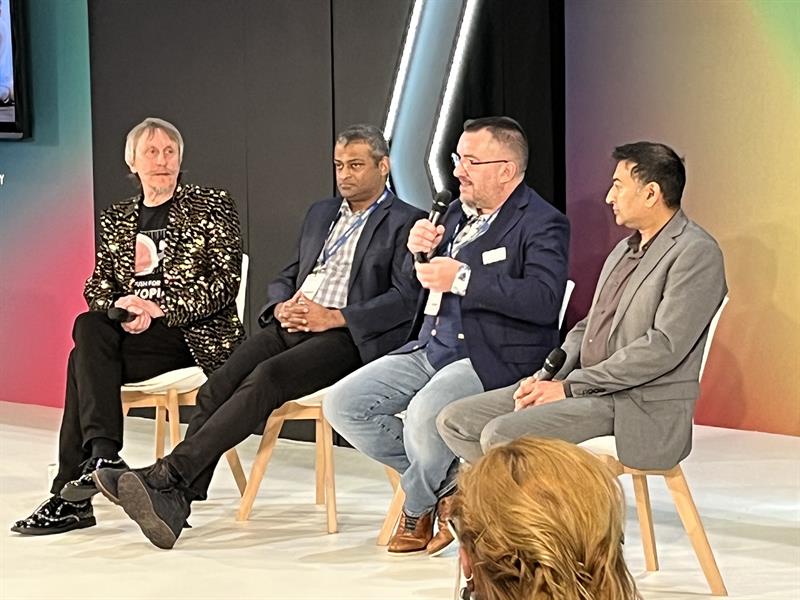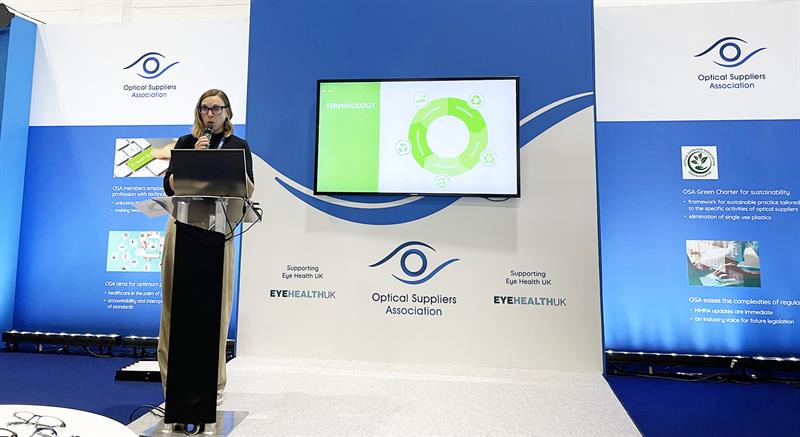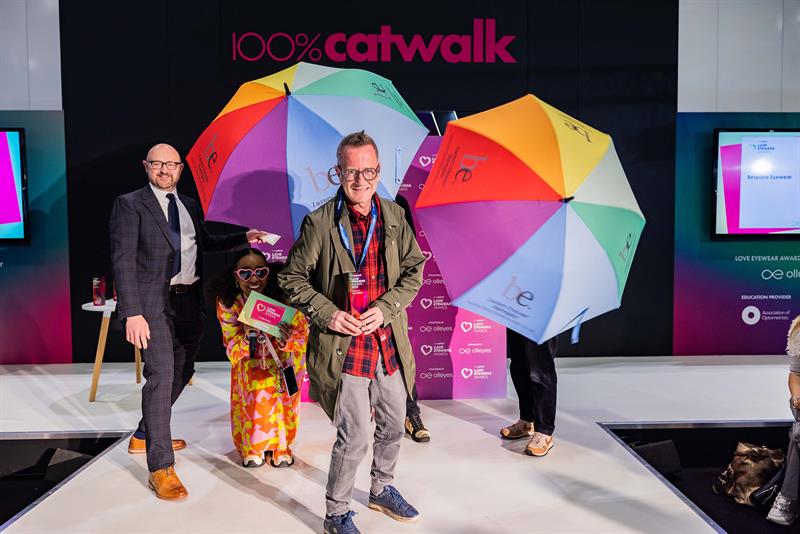
AI analysis
A presentation on the history and benefits of using artificial intelligence (AI) as an assistive tool in comprehensive retinal analysis was held by Optos chief technology officer, Derek Swan, on the Main Stage.
Swan highlighted that AI technology provides a significant opportunity for detecting early diagnosis of eye conditions through extended retinal imaging data, if adopted and used appropriately by optometrists.
He outlined that it was ideal to implement AI optometry tools now due to the current prevalence of eye disorders, increasing elderly population and advances in treatments and technology.
‘AI plays a role in the accuracy of image analysis, quantification classification, moving into predictive risk, longitudinal monitoring, and improving practice efficiency in an already burdened healthcare system,’ Swan added.
An online study conducted on practitioners found that 74% of respondents claim to have either not very much knowledge or no knowledge at all about AI, yet 53% believed they will be adopting AI solutions in their practice within the next five years, suggesting a gap between knowledge and appetite for adoption, he said.
However, potential issues that still need to be addressed included a lack of regulations over standards of AI analysis retinal imaging equipment, data management, privacy and governance risks.
Steps to management
A critique of evidence-based guidance on myopia management compliance for practitioners was presented by Ian Flitcroft, paediatric ophthalmologist and co-founder of Ocumetra, on Saturday evening at the Main Stage.
Flitcroft provided a five-step guide on myopia management, spanning from practitioners not correcting myopia (but referring on) to providing basic single vision lenses and an educational myopia conversation, to the highest standards of care; myopia progression intervention and comprehensive monitoring and management planning.
He advised practitioners to identify where their standards lay and to aim for intervention and treatment plan as ideal services.
The varying standards of care provided in optical bodies’ myopia guidance reports were reviewed, including College of Optometrists 2019 and 2022 guidelines, the World Council of Optometry (WCO), and the International Myopia Institute (IMI) and European Society of Ophthalmology (ESO) joint guidelines.
He said the guidelines presented show an evolution in myopia management standards, all the way through from correction and into an era where eye care practitioners are managing, mitigating and controlling myopia.
Flitcroft recommended the 2021 updated guidance by the IMI and ESO, which advised strategising treatment interventions, lifestyle advice, and full refraction, and the WCO’s latest myopia standard of care as close to ‘gold standards’.
The College’s 2019 myopia compliance guidelines were criticised for not supporting myopia intervention due to alleged insufficient evidence, which Flitcroft denied, but have since turned around to supporting active myopia management in the updated 2022 guidelines.

Myopia panel discussion
In the lunchtime slot on the Sunday at the show, Jason Higginbotham, optometrist and managing editor at myopiafocus.org, chaired a well-attended panel discussion on myopia management.
The panel consisted of Sandip Doshi, optometrist and owner at the Eyecare Centre; Brian Tompkins, optometrist and owner at TK&S Optometrists; and Bhavin Shah, optometrist and founder at Central Vision Opticians.
Given the limited half hour running time, Higginbotham structured the session around three key topics and made time for some questions from the audience.
On introducing myopia management to parents, Tompkins said his practice staff actively discuss it with would-be parents before a child is born.
Shah added that, once a child becomes myopic, the next conversation with parents is crucial and they should be informed about what myopia is, how it will progress, and general lifestyle issues at play beyond genetics.
The panel also discussed their preferred treatments for myopia. All three selected orthokeratology contact lenses as the best option while also noting the high quality of alternatives.
Doshi said his son had benefitted clinically from orthokeratology treatment while at school and that his sports performance had also improved.
Tompkins noted a key benefit of orthokeratology is, as the lenses are used at night, the child’s parents are on hand to manage the process.
Spotlight on sustainability
On Monday at the Optical Supplier Association’s stage, Emily Andrews, product director at Eyespace, presented an introduction to environmentally friendly frame materials.
She said the eyewear company made sustainability the focal point of its mission and introduced new materials across its entire product range.

Andrews highlighted there was no perfect alternative that did not leave a mark on the environment, but the options available were significantly more sustainable than existing plastic solutions.
For example, the lifetime of bio-degradable materials could be as little as five years, compared to the 500 years of plastic materials.
Andrews said there was no set standard for using sustainability as a term, making it open to interpretation and causing confusion among consumers. Eyespace worked to the definition of ‘a product designed with little or no effect on the environment’.
She explored other terminology, such as the difference between recyclable and recycled, and compostable and bio-degradable.
Highlighting the importance of sustainability to consumers, Andrews cited that 36% of Brits were buying product from companies with strong environmental credentials.
Furthermore, 80% were planning to buy with sustainability in mind and 72% said they paid attention to whether a business was pursuing green initiatives.
Andrews explained the different frame materials Eyespace used and asked attendees if they could identify the materials in eyewear handed out for demonstration.
Materials included: recycled marine plastic, which was upcycled sea waste; recycled plastic manufactured from polyethylene terephthalate, which was commonly used in plastic bottles; recycled stainless steel, which Andrews said was 100% recyclable but difficult to source; bio-based acetate, which was made from cotton or wood pulp like regular acetate but mixed with natural, non-toxic plasticisers; and bio-based injected plastic made from castor seed oil that had similar qualities to TR90.
Andrews also highlighted how Eyespace explored more sustainable solutions for eyewear cases, demo lenses and polybags.
Cost of materials was highlighted by Andrews throughout the presentation, which she said could be prohibitive to companies introducing more sustainable materials.
However, she noted that since Eyespace introduced bio-degradable polybags for all of its frames several years ago, the price had decreased by a quarter. The more accessible the materials become, the more the cost comes down, Andrews concluded.
Winners of Love Eyewear Awards named
On Saturday at 100% Optical, the Catwalk hosted the presentation ceremony of the Love Eyewear Awards 2023 with winners selected by a panel of judges from the industry.
 Nathan Garnett, 100% Optical show director, said: ‘I know the judges had an unbelievably tough time choosing this year’s winners given the incredible talent, enthusiasm and passion which shine through all of our entries. It’s a real reflection of the quality and innovation in eyewear design in 2023. Huge congratulations to everyone who entered and those who were named worthy category winners. As always, it was a great atmosphere.’
Nathan Garnett, 100% Optical show director, said: ‘I know the judges had an unbelievably tough time choosing this year’s winners given the incredible talent, enthusiasm and passion which shine through all of our entries. It’s a real reflection of the quality and innovation in eyewear design in 2023. Huge congratulations to everyone who entered and those who were named worthy category winners. As always, it was a great atmosphere.’
Winners
- New Designer 2023: Ffin Eyewear
- Women’s Frame of the Year: OtrO Eyewear – Arena
- Women’s Sunglasses Frame of the Year: Woody’s Eyewear – Neon – G
- Men’s Frame of the Year: Struktur Eyewear – The Paris Light
- Men’s Sunglasses Frame of the Year: Ffin Eyewear – Ana
- Unisex Frame of the Year: Pepe Jeans London – Bangkok
- Luxury Frame of the Year: Yohji Yamamoto – SL014-A008
- Kids Frame of the Year: Rolf – Kudu
- Sustainable Frame of the Year: Vava – CL0012
- Eyewear Accessory of the Year: Ampere – Dusk
- Eyewear Retailer of the Year: The Focal Rooms by The BilBro & Co, Co.
- Most Engaging Practice Window: Bespoke Eyewear
